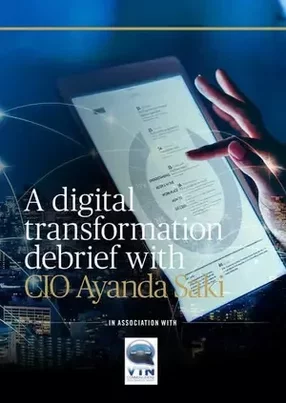Resolving digital transformation challenges with CIO Ayanda Saki
As more CIOs take the first tentative steps on their digital transformation journeys, many are turning to seasoned professionals for guidance. With over 20 years of experience in the technology sector, Ayanda Saki, now CIO at a leading African automotive parts company, is a fountain of wisdom. For Saki, her technology career began after she obtained her Computer Science degree, which allowed her to gain a true understanding of technological innovation. Later, before cutting her teeth in the sector, Saki completed a Master’s Degree in Business Administration (MBA). She credits this educational experience with affording her the necessary insight to distinguish between technology for technology’s sake in comparison to technology which enables true business value.
Business prowess
“I realised that it didn’t make sense to have a technical understanding of technology without having the necessary business acumen to understand how these can help businesses generate revenue or build strategies,” she recalls. By understanding how the business works as well as what it hopes to achieve, Saki has been able to align her digital strategies to meet these needs, whilst remaining laser focused on the people involved.
“Throughout my career, I made sure I understood the businesses, how it worked and what it was trying to achieve, then aligned the technology as much as possible to that,” she says. “Technology shouldn’t be implemented for the sake of it. Technology should be used to improve the quality of life of people and to enable business value. I think this perspective has created a good foundation for where I am today.”
This business insight has put her in good stead in the technology sector. Whilst Saki may have an impressive understanding of technology – spanning everything from software engineering to business intelligence – she says that, more than anything, it’s vital executives recognise that the customer is king. “In recent years, the biggest change has been that the power is now in the hands of the customer. The customer now decides how they want to buy, who they want to buy from, and when they want to buy it.” As the on demand economy takes off and more and more devices are at our fingertips, this challenge is only set to amplify. Mobile phone ownership is racing ahead in South Africa and across the continent. This not only serves as a communication device but also as a cost-effective channel to get online, which has provided companies with the opportunity to interact with customers like never before. “Africa is very mobile focused and this creates an opportunity for us to provide an economic type of architecture for our customers,” comments Saki. “It’s required us to adjust our thinking and to align ourselves with how the customer interacts with us.”
The customer is king
Not only should CIOs pay heed to their customers’ wants and needs, but they should also be aware of their location. Digital transformation isn’t ‘one size fits all’, and therefore companies should be wary of copying and pasting their business strategies into new locations. The key, Saki highlights, is to adapt to each location.
“In Africa, many of the companies are multinational companies and when they’ve entered this market, they’ve taken the same template of their business from international markets and applied it here which doesn’t work. For an African market, the way a business sells to its customers has to be different as their buying power is different, and the way they interact with the market has to be different as they have typically have less access to technology. It requires a shift in thinking.”
Saki cites Unilever’s entry into the rural Indian market as a relevant case study to parallel. After conducting in-depth research, the firm calculated the buying power of an average woman in India and worked out how they could effectively sell to this market. “For instance, many consumers didn’t have the buying power to purchase a 100ml bottle of body lotion so following the study Unilever launched smaller 20ml packets of body lotion which were more affordable and which allowed the company to penetrate the market further,” she explains. “I think the same mindset needs to be applied in South Africa.”
Convenience is crucial
The success of firms like Amazon, Deliveroo, Uber and others only goes to show that convenience sells. This is a sentiment echoed by Saki who contends that as more and more businesses go digital, convenience will be the differentiating factor. “We’re seeing that the companies which are succeeding in digitisation are companies which create convenience that goes over and above just buying a product,” Saki reflects. “The better the customer experience, the more chance of customers coming back time and time again.” Data analytics, cloud computing and other emerging technologies could play a key role in realising this goal, Saki notes.
See also:
- How digital transformation at ABC improves the Lebanese shopping experience
- Fakeeh Healthcare undergoes a digital transformation as part of Saudi Vision 2030
- A sustainability journey with T-Mobile
Tackling the skills gap
One of the most pressing challenges facing the technology sector is undoubtedly the widening skills gap in the market. In a world where today’s graduates have grown up with the internet, tablets and mobile devices, Saki said that young people already have an inherent understanding of IT, what recruiters need to watch out for is those who can take this understanding and do something new with it. Additionally, she believes there needs to be a cultural shift that encourages young people to enter more corporate environments. “I believe there’s so much value in combining how older and younger people think, especially as we move towards a more digital future,” she observes. “We need to make a lot of changes to absorb this new talent into the technology landscape.”
Creating an inclusive environment could also help. Having studied in apartheid times in South Africa, as well as being a woman in the technology field, Saki is all too aware of the hurdles facing workers trying to make their mark on the technology sector. “From the very beginning it was really hard to be taken seriously as a woman,” she reflects. “Even if you said something that had value, you had to say it a number of times, justify it a million times more, and sometimes even demonstrate it for you to be taken seriously.
“I think what helped me was that if I feel an issue is important, I’ll create a prototype of the suggestion which allowed me to demonstrate my ideas clearly.” On top of this, there’s also the issue of work culture. In the corporate world, where competing egos are commonplace, Saki is keen to point out the importance of remaining humble, particularly when you’re in a leadership position. In doing so, she says CIOs can create an approachable and inclusive IT environment that works with, not in tangent, to the wider business operation. “I try to keep myself humble and approachable,” she says. “It’s important to be able to explain technology in a way that makes sense to businesses so that they can really comprehend how IT can benefit the organisation.”

- Top 100 Women 2024: Tanja Rueckert, Bosch - No. 6Digital Transformation
- Coforge: Arming Financial Firms with the Tools to InnovateDigital Transformation
- Coforge: Arming Financial Firms with the Tools to InnovateDigital Transformation
- MWC24: Harnessing AI to Modernise Telcos with Tech MahindraDigital Transformation

